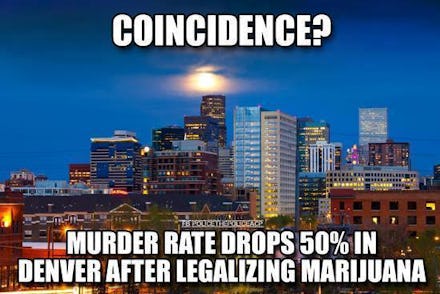One Meme Sums Up What Happened to Denver's Murder Rate After Marijuana Legalization

The news: Colorado continues riding high in the wake of marijuana legalization.
Image Credit: Marijuana
According to government data released this week, the city- and countywide murder rate has dropped 52.9% since recreational marijuana use was legalized in January. This is compared to the same period last year, a time frame encompassing Jan. 1 through April 30.
Image Credit: denvergov.org
The shift accompanies a dip in violent crime overall, as sexual assault fell 13.6% and robbery and aggravated assault fell 4.8% and 3.7%, respectively.
The data pool's size is important to note, as eight murders compared to 17 in the same time frame last year may seem a blip on the radar. On the other hand, a full quarter of the year has passed. It may be too soon to definitively attribute these changes to marijuana legalization, but the possibility of a correlative pattern is certainly worth keeping an eye on.
Background: All told, the first few months of legalization have been a boon to Colorado's economy.
In March 2014 alone, taxed and legal recreational marijuana sales generated nearly $19 million, up from $14 million in February. The first three months of the year have also earned the state $7.3 million in tax revenue — $12.6 million, if you include funds generated by medical marijuana. Legal cannabis sales are projected to reach up to $2.57 billion nationwide this year.
As a direct result, the Colorado state legislature has expressed plans to spend $33 million of these funds on school nurses and public education around marijuana. Ten percent to 15% is also expected to be distributed among the state's police departments, allegedly to be used on DUI enforcement. All this despite countless efforts on Mayor Michael Hancock's part to restrict the parameters around legalization:
Time will tell who gets the last laugh.
Also: As PolicyMic's Tom McKay points out, the fallout from legalization has been far from the crime-fuelled societal collapse critics warned about. Not only is violent crime down across the board statewide, the legislation's effects can be seen in a much wider array of spaces — one being the shifting priorities of Mexican drug cartels and the marijuana growers they employ.
"I wish Americans would stop with this legalization," Mexican grower Rodrigo Silla told the Washington Post last month. According to him, the financial burden placed on growers by the legal industry in the U.S. has made cultivating cannabis "not worth it anymore."
Consequently — and unfortunately — more growers are moving into the heroin industry to compensate for lost business.
But: Amid all these developments, the legalization wave shows few signs of dissipating. According to a High Times report, nine states are currently exploring legislative changes around marijuana use, yet another indication of the plant's expanding national prioritization.
A medical marijuana legalization bill was recently introduced in North Carolina. New York and Illinois have recently seen major steps forward toward permission for medical use. In California, law enforcement agencies may soon be required to return marijuana and related items seized from people whose cases were dismissed or acquitted.
And a recent Gallup poll indicates that 60% of Americans favor "eliminating [marijuana] prohibition," a number expected to reach 75% by 2023. Put simply, we may be nearing the end of a particularly grim chapter in American legal history.